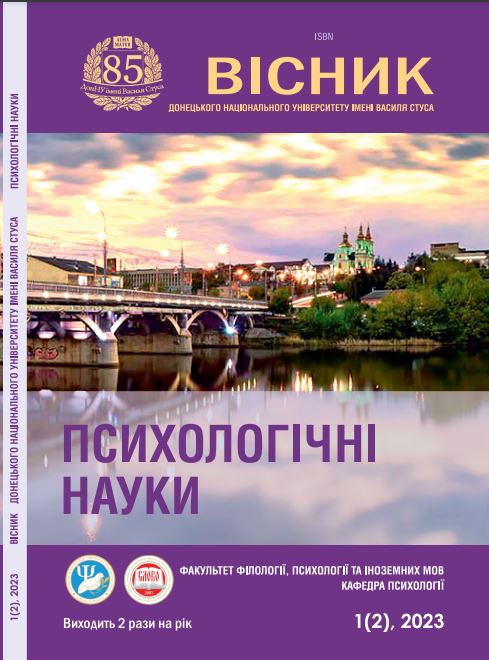Професійне вигорання педагогів в умовах дистанційного навчання
DOI:
https://doi.org/10.31558/2786-8745.2023.1(2).10Ключові слова:
професійне вигорання; дистанційне навчання; деперсоналізація; емоційне виснаження; редукція професійних досягнень; емоційні бар’єриАнотація
В статті розглядаються особливості професійного вигорання педагогів в умовах дистанційного навчання. в ході дослідження були використані: Методика «Діагностика професійного вигорання» К. Маслач, С. Джексон, в адаптації Н. Водоп’янова; методика В. Бойка «Діагностика емоційних бар’єрів у спілкуванні», авторська анкета для визначення особливостей ставлення педагогів до дистанційного навчання.
Для проведення дослідження було сформовано вибірку з 36-ти вчителів, 26-ти жінок та 10-ти чоловіків. Вік респондентів становив від 24 до 55 років.
Було встановлено, що більшість опитуваних демонструють середні та високі показники професійного вигорання, що виявляються в таких ознаках як: емоційне виснаження, деперсоналізація та професійна редукція. Серед домінуючих емоційних бар’єрів вчителів, – негнучкість, невиразність емоцій та неадекватність, нездатність керувати емоціями.
За результатами авторської анкети встановлено, що у 75% опитаних вчителів дистанційне навчання викликає «втому і роздратування», 10 % респондентів ставиться до цієї форми навчання нейтрально і 15 % опитаних вчителів схвалюють дистанційну форму навчання.
Аналіз анкетних даних також вказує на труднощі з боку вчителів у встановленні емоційного контакту з учнями, проблеми професійної самореалізації.
В перспективі дослідження вважаємо доцільним вивчити можливості оптимізації відновлення особистих ресурсів вчителів та розробити психокорекційну програму для запобігання емоційного та професійного вигорання вчителів в умовах дистанційного навчання.
Посилання
Бегун-Трачук Л. О. Дослідження професійного та емоційного вигорання у психолого-педагогічній теорії та практиці. Музичне мистецтво в освітологічному дискурсі. № 5, 2020. С. 128-133.
Бойко В. В. Синдром «эмоционального выгорания» в профессиональном общении. СПб.: Питер, 1999. С. 206.
Булатевич Н. М. Синдром емоційного вигорання вчителя: роль індивідуальних й організаційних чинників. К., 2005. Вип. 22-23. С. 47–50.
Гнездилова О. Н. Инновационная педагогическая деятельность как фактор предупреждения эмоционального выгорания учителя : дисс. канд. психол. наук. M., 2005.
Зайчикова Т. В. Соціально-психологічні детермінанти синдрому «професійного вигорання» у вчителів: автореф. дис. канд. психол.наук: 19.00.05 / Інститут психології ім. Г.С.Костюка АПН України. К., 2005. 20 с.
Кокун О. М. Психологія становлення сучасного фахівця. К.: ДП «Інформ.-аналіт. агенство», 2012. 200 с.
Чайнікова А. Д. Кириченко О. М. Психолого-педагогічний аналіз ефективності дистанційного навчання. Габітус. Вип.25. С. 196-201.
Freudenberger H. J. Staff Burnout. Journal of Social Issues. 1974. Vol. 30. Pp. 159-165.
Maslach C., Leiter M. The Truth About Burnout, San Francisco, 1997.

